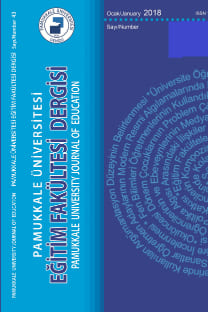Türkçenin Yabancı Dil Olarak Öğretiminde Şikayet ve Özür Edimine İlişkin Görünümler
Söz edimi, şikayet, özür, yabancı dil olarak öğretimi
Aspect of Complaint and Apology Performatives in Teaching Turkish as a Foreign Language
Speech act, complaint, apology, foreign language teaching,
___
- Austin, J.L. (2009). Söylemek ve yapmak. Çev: R. Levent Aysever. İstanbul: Metis.
- Bachman, L.F. (1990). Fundamental Considerations in Language Testing. Oxford: Oxford University Press.
- Barnlund, D. C., & Yoshioka, M. (1990). Apologies: Japanese and American styles. International Journal of Intercultural Relations, 14(2), 193-206.
- Bergman ML, Kasper G (1993). Perception and performance in native and nonnative apology. In Interlanguage Pragmatics. Blum-Kulka, Shoshana, Kasper, Gabriele (Eds.), Oxford University Press, Oxford, pp. 82–107.
- Blum-Kulka S, Kasper G (1993). Interlanguage pragmatics Speech Act Realization. In Interlanguage pragmatics. Blum-Kulka, Shoshana, Kasper, Gabriele (Eds.) Oxford University Press, Oxford, pp. 59–63.
- Blum-Kulka, S., & Olshtain, E. (1984). Requests and apologies: A cross-cultural study of speech act realization patterns (CCSARP). Applied Linguistics, 5(3), 196-212.
- Boxer, D. (1993) Social distance and speech behavior: The case of indirect complaints. Journal of Pragmatics, 19(2), 103-125.
- Butler, C. D. (2001). The role of context in the apology speech act: A socio-constructivist analysis of the interpretations of native English-speaking college students. Yayınlanmamış doktora tezi, The University of Texas, Austin, Texas.
- Canale, M. (1983). “From Communicative Competence to Communicative Language Pedagogy”. In Language and Communication. Richards, J. and Schmidt, R (eds.).. London:Longman.
- Canale, M., and Swain, M. (1983). “From Communicative Competence to Communicative Language Pedagogy”. In. Language and Communication. Richards, J & Shmitdh.,R (eds.). London:Longman, 1983, pp 6-7.
- Deutschmann, M. (2003). Apologising in British English., Yayınlanmamış doktora tezi, Umea Universiteit, Unmea.
- Fraser B (1981). On apologizing. In Conversational Routine: Exploration in Standardized Communication Situations and Prepatterned Speech. Mouton, Coulmas, Florian (Ed.), The Hague, pp. 259–271.
- Harlow, H.L. (1990). “Do They Mean What They Say? Sociopragmatic Competence and Second Language Learenrs. Modern Language Journal, 74(1), 328-9.
- Hatch, E. (1992). Discourse and language education: Speech acts and speech events, (pp.140-147). Cambridge: Cambridge University Press.
- Holmes J (1995). Women, Men and Politeness. Longman, London.
- Holmes, J. (1993). New Zealand women are good to talk to: An analysis of politeness strategies in interaction. Journal of Pragmatics, 20(2), 91-116.
- Holmes, J. (1990). Apologies in New Zealand English. Language in Society, 19(2), 155-199. Hymes, D.H. (1972) “On Communicative Competence” In: J.B. Pride and J. Holmes (eds) Sociolinguistics. Selected Readings. Harmondsworth: Penguin, pp. 269-293.
- Majeed, A. ve Janjua, F. (2014). Apology strategies and gender: A Pragmatic study of apology speech acts in Urdu language. Merit Research Journal of Education and Review, 2(3), 54-61.
- Mey, J. (2001) Pragmatics: An Introduction. Oxford: Blackwell.
- Moon, K. (2001). Speech act study: differences between native and nonnative speakers' complaint strategies. The American University. Retrieved from www.Science-directjournal. Com
- Murphy, B. &. Neu, J. (1996). My grade's too low: The speech act set of complaining. In Speech Acts Across Cultures: Challenges to Communication in Second Language, S. M. Gass & J. Neu (Eds.), 191-216, Berlin: Mouton de Gruyter.
- Noisiri, W. 2002. Speech Act of Complaint: Pragmatics Study of Complaint Behaviour between Males and Females in Thai. University of Sussex, 1-18.
- Olshtain, E. and Weinbach, L. (1993) Interlanguage features of the speech act of complaining. In Interlanguage Pragmatics. Kasper, G. & Blum-Kulka, S. (Eds.), Oxford: Oxford University Press, pp. 108-122.
- Olshtain, E. and Weinbach, L. (1987). “Complaints: A Study of Speech Act Behavior Among Native and Nonnative Speakers of Hebrew”. In J. Verschueren and Bertucelli- Papi(Eds.), The Pragmatic Perspective (PP. 195-208) Amsterdam: John Benjamins.
- Olshtain, E. and A. D. Cohen. (1983). Apology: A speech act set. In N. Wolfson and E. Judd (Eds.) Sociolinguistics and Language Acquisition. Rowley, MA: Newbury House, 18-35.
- Owen, M. (1983). Apologies and remedial interchanges: A study of language use in social interaction. New York: Mouton.
- Rivers, W. (1973). From Linguistic to Communicative Competence. TESOL Quarterly, 7 (1), 25-34. Sauer, M. (2001). Complaints: A Cross-cultural study of pragmatic strategies and linguistic forms. Paper presented at AAAL Conference, Vancouver, Canada.
- Searle, J.R. (2000). Söz edimleri. Çev: R. Levent Aysever. Ankara: Ayraç Yayınevi.
- Suszczynska, M. (1999). Apologizing in English, Polish and Hungarian: Different languages, different strategies. Journal of Pragmatics, 31(8), 1053-1065.
- Takahashi, S. (1996). “Pragmatic Transferability”. Studies in ELT. 18/2, 189-222.
- Tanck, S. (2002). Speech act sets of refusal and complaint: A comparison of native and non-native English speakers' production. Studies in Second Language Acquisition, 13, 65-81.
- Taylor, I. And Taylor, M.M. (1990). Psycholinguistics:Learning and Using Language. New Jersey: Prentice Hall.
- Thomas, J. (1983). Cross-Cultural Pragmatic Failure. Applied Linguistics. 4 (2), 91-112.
- Trosborg, A. (1995). Interlanguage pragmatics: Requests, complaints and apologies. New York: Mouton de Gruyter.
- Trosborg, A. (1987). Apology strategies in natives/non-natives. Journal of Pragmatics, 11(2), 147-167.
- Tuncel R. (2011). Apologizing and speech act realizations of Turkish Efl learners. International Conference on Management, Economics and Social Sciences (ICMESS'2011), Bangkok Dec.
- Wannaruk, A. (2005). Pragmatic transfer in Thai EFL refusals. Paper presented at the13th Annual KOTESOL International Conference, October 15-16, Seoul, Korea.
- Yamagashira, H. (2001). Pragmatic transfer in Japanese ESL refusals. Pragmatic Transfer, 31, 259-275.
- Yule, G. (2010) The Study of Language. Cambridge: Cambridge University Press.
- ISSN: 1301-0085
- Yayın Aralığı: 3
- Başlangıç: 1996
- Yayıncı: -
Ortaokul (5., 6., 7., ve 8. Sınıf) Öğrencilerinin Daimi Bilim Öğrenme Motivasyonlarının İncelenmesi
Sanat Eğitiminde Mekân Kavramının Teknolojik Gelişmelerle Sanatçıların Yapıtlarındaki Başkalaşımı
İlköğretim Ders Kitaplarında Engellilik
Derya CAN, Canan PEKBAY, Meral HAKVERDİ CAN, Gökhan KAYA, Ayşegül AVŞAR TUNCAY, Sevcan CANDAN
Mustafa BULUŞ, Ayşe ÖZTÜRK SAMUR
Ergenlerde Öznel İyi Oluş ve Zaman Tutumu: Benlik Saygısı ve İyimserliğin Aracı Rolü
Özlem TAGAY, Hülya ŞAHİN BALTACI
Türkçenin Yabancı Dil Olarak Öğretiminde Şikayet ve Özür Edimine İlişkin Görünümler
Üniversite Öğrencilerinin Üniversitede Sunulabilecek Hizmetlere Yönelik İhtiyaçları
Oya GÜNERİ, Funda BARUTÇU YILDIRIM, Yeşim ÇAPA AYDIN, Dean W. OWEN, Selda ÇELEN DEMİRTAŞ
Fen Eğitiminde Bilgi İşlemsel Düşünme ve Bütünleştirilmiş Alanlar Yaklaşımı (STEAM)
